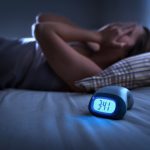Famous People With Sleep Disorders: Voltaire
Posted by Paul Landini

Voltaire (aka, François-Marie Arouet) was a French writer, philosopher, and progressive activist from the 18th century. A major figure of the European intellectual movement known as the Enlightenment, Voltaire was also a world-class caffeine addict. It’s reported that he would drink somewhere between 40 to 70 cups of coffee a day! No wonder the poor guy suffered from disordered sleep; word has it he would sleep no more than four hours a night.
And yet, even on this meager sleep schedule, Voltaire was still able to produce a ton of work. His prolific output covered all literary forms, from plays and poems, to novels and essays. On top of that, Voltaire also managed to write upwards of 20,000 letters to such luminaries as King Frederick the Great and fellow philosopher Jean-Jacques Rousseau.
It’s not too hard to connect the dots between Voltaire’s mind-boggling coffee consumption, his heroic work ethic, and his life-long insomnia. Caffeine—the natural stimulant found in coffee and tea— increases alertness, minimizes the effects of fatigue, and can improve general cognitive functions. These are things you want when you’re, say, working on redefining the values and ethics of society at large. However, all that artificial energy and alertness becomes a bane when it’s time for bed.
Medical experts recommend capping your daily caffeine intake at around 400 mg. Chances are you’re not slamming back coffees by the dozen, but these days caffeine and similar stimulants can be found in all sorts of products. If you often find yourself lying awake at night praying for some sheep to count, it’s worth giving your diet an audit to see where caffeine could be creeping into your system. Here’s a short list of potential offenders, from the obvious to the not-so-obvious, to the downright awful.
The obvious
Coffee, tea, soda.
The average Canadian consumes between 210-238 mg of caffeine daily. These three beverages are responsible for the vast majority of that intake. There’s really no reason for anyone to drink soda, so ditch the carbonated sugar-water and try to limit yourself to four cups of coffee and/or tea per day. But beware—not all cups of coffee are caffeinated equally. A 12-ounce “tall” cup of Starbucks drip delivers a whopping 235 mg of caffeine.
The not-so-obvious
Decaffeinated coffee, green tea, chocolate.
I hate to break it to you, but that cup of decaf you’re sipping on still has caffeine in it. Granted, it’s a fraction of the content compared to the regular stuff (anywhere from two to 15 mg per cup, versus 80 to 100 mg), but if you’re sensitive to caffeine or struggle often with sleeplessness, any amount can pose a problem.
The same goes for green tea. Despite its reputation as a stimulant-free alternative, a cup of green tea contains between 30-50 mg of caffeine. Chocolate is another secret source of caffeine. Dark chocolate has 12 mg per ounce, milk chocolate nine mg. If you’re looking for a truly caffeine-free way to satiate your sweet tooth, consider white chocolate.
The downright awful
Energy drinks, pre-workout drinks, fat-burning supplements.
We’ve reached the bottom of the barrel here, folks. Whereas the previously-mentioned items each have some value (except for soda; that stuff is pure garbage), these things are not only worthless, they’re dangerous too. Red Bull, Monster and Rockstar are the most popular brands of energy drinks, and while their caffeine content isn’t all that different from a standard cup of coffee, they’re typically loaded with sugar and other stimulants.
Pre-workout drinks and fat-burning supplements are the most niche products on this list. Like 99% of sports supplements, they’re nothing but snake oil wrapped in pretty packaging, delivered with seductive sales pitches promising to give you the body of your dreams. Don’t be duped. Both items work off the same premise—overload the caffeine and hope for the best. If you need an energy boost before hitting the gym, stick with espresso.




